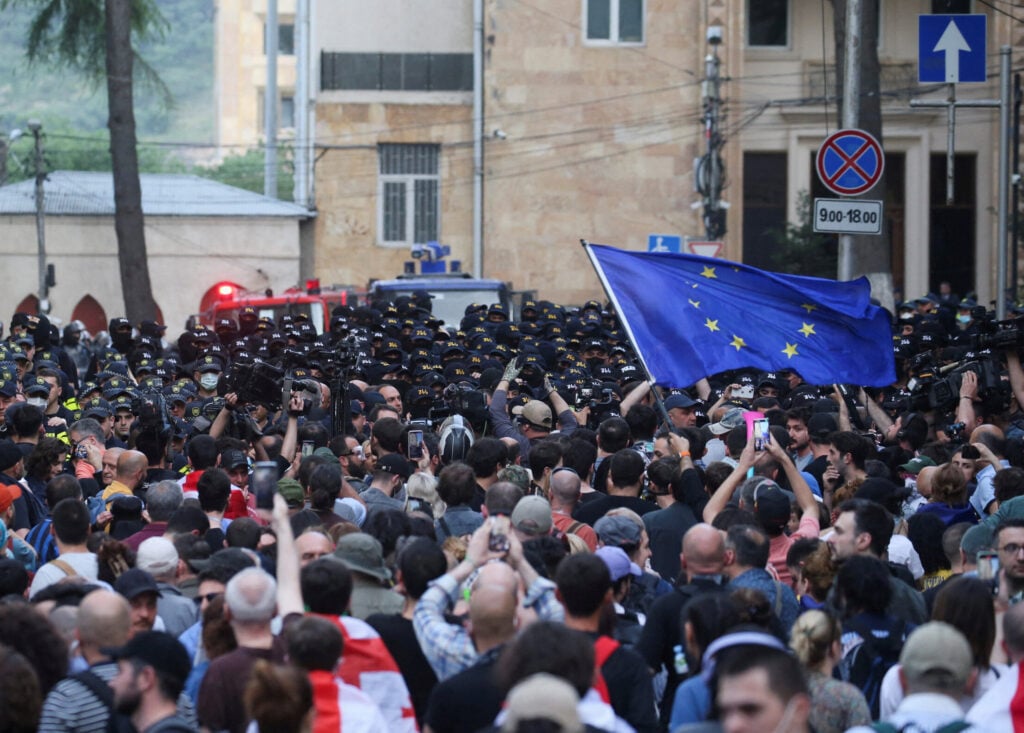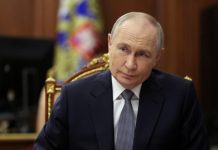By Nicholas Chkhaidze, for UkraineAlert
Recent efforts by the Georgian government to adopt a Kremlin-style law imposing restrictions on civil society have laid bare the geopolitical struggle currently underway to define the country’s future. The escalating crisis in the southern Caucasus nation also offers some indications of the end game Russia may have in mind if it succeeds in defeating Ukraine.
Georgia’s contentious Foreign Agents Law, which was proposed but shelved in 2023 following an initial round of protests, was revived in spring 2024 by the ruling Georgian Dream party. Unsurprisingly, these efforts have sparked renewed protests on an even larger scale.
Critics say the bill is an attempt to crack down on the country’s political opposition and civil society, and have dubbed it “the Russian law” due to its striking similarity to legislation used by the Kremlin to muzzle domestic opponents of the Putin regime. The bill is also notable for positioning Georgia’s traditional Western allies as adversaries while refraining from mentioning Russia, which currently occupies around twenty percent of the country.
The Georgian government’s bid to adopt legislation reminiscent of Putin’s Russia is all the more remarkable as polls show that around eighty percent of Georgians favor integration with NATO and the EU. This has provoked a major public backlash within Georgia and has led to harsh criticism from the country’s Western partners. In a recent statement, the US State Department warned that the contentious legislation along with accompanying anti-Western rhetoric from Georgian Dream representatives placed the country on a “precarious trajectory” that could “jeopardize Georgia’s path to Euro-Atlantic integration.”
None of these appears to have deterred the Georgian authorities. As the crisis escalated in late April, the founder and unofficial leader of the Georgian Dream party, billionaire Bidzina Ivanishvili, doubled down on his party’s increasingly conspiratorial, anti-Western posturing in a rare public address that was reminiscent of Kremlin propaganda. Ivanishvili’s speech was widely viewed as a major milestone in his party’s attempts to turn Georgia away from the West and toward Russia.
With Georgian society at a geopolitical crossroads and engulfed in increasing violence amid a draconian crackdown on mass protests, many observers are drawing parallels with Ukraine’s 2013-14 Euromaidan Revolution. Some are even asking whether the country is now experiencing its own “Yanukovych moment,” a reference to the pro-Kremlin Ukrainian president who fled to Russia following months of unrest.
The two situations certainly appear to have much in common. On both occasions, the country’s pro-Western political forces and civil society protested against an increasingly authoritarian and Kremlin-friendly government in order to defend their basic democratic rights. On both occasions, the brutality of the regime’s response fueled a surge in public support for the protests.
Georgia’s broader political trajectory may also provide some insights into Russia’s plans if its invasion of Ukraine proves successful. The Georgian Dream party first came to power in 2012 at a time when the wounds of Russia’s 2008 invasion of Georgia were still raw. Over the past 12 years, the party has been able to gradually consolidate its grip on power, becoming steadily bolder in its promotion of pro-Kremlin and anti-Western positions. This has been achieved despite the overwhelmingly pro-Western mood in the country.
This kind of scenario appears to be what Russia had in mind for Ukraine at the start of the full-scale invasion in February 2022. Moscow’s initial plan was to decapitate the government in Kyiv and install a puppet regime that would end Ukraine’s Western integration and anchor the country firmly in the Kremlin orbit, despite strong Ukrainian public support for a European future.
While Russia’s initial blitzkrieg failed, the war continues and Moscow has clearly not abandoned its efforts to subjugate Ukraine. Indeed, recent reports of a foiled Russian plot to assassinate Ukrainian President Volodymyr Zelenskyy and other senior Ukrainian officials suggest the Kremlin still hopes to install a friendlier regime in Kyiv. As they look to address the realities of fierce public opposition to Russia throughout Ukrainian society, Russian policymakers will surely draw on their experience in Georgia over the past decade or so.
The current protests in Georgia are taking place as the country prepares for parliamentary elections in October. The fate of the Foreign Agents Law is expected to significantly impact the course of the coming vote, with Georgian Dream officials accused of planning to use the legislation to silence opponents. The outcome of the October election will tell us much about Georgia’s likely future geopolitical direction. It will also serve as a verdict of sorts on Moscow’s efforts to regain influence in the country despite the painful legacy of the 2008 invasion and the ongoing occupation of Georgian land. This will have huge implications for the wider southern Caucasus region, and may also help shape Russia’s approach to the ongoing invasion of Ukraine.
By Nicholas Chkhaidze, for UkraineAlert
Nicholas Chkhaidze is a Research Fellow at the Baku-based Topchubashov Center.





